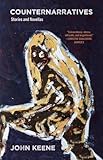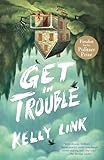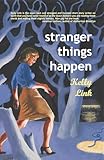This year’s “Genius grant” winners have been announced. The MacArthur grant awards $625,000 “no strings attached” to “talented individuals who have shown extraordinary originality and dedication in their creative pursuits and a marked capacity for self-direction.” Alongside scientists, artists and scholars are some newly minted geniuses with a literary focus. This year’s literary geniuses are:
Natalie Diaz is a poet who connects her experiences as a Mojave American and Latina woman to cultural and mythological systems of belief and Indigenous love in America. Her first collection, When My Brother Was an Aztec (2012), focuses on her brother’s drug addiction and her childhood on the reservation. Manuel Gonzalez described the collection as “stellar” in his Year in Reading 2016, and Nick Ripatrazone, in his Must-Read Poetry 2018, said this about her poem, included in the New Poets of Native Nations (ed. Heid E. Erdrich): “And then there’s Natalie Diaz, who will stop you, sit you right up: “Native Americans make up less than / one percent of the population of America. / 0.8 percent of 100 percent. / O, mine efficient country.”
is a poet who connects her experiences as a Mojave American and Latina woman to cultural and mythological systems of belief and Indigenous love in America. Her first collection, When My Brother Was an Aztec (2012), focuses on her brother’s drug addiction and her childhood on the reservation. Manuel Gonzalez described the collection as “stellar” in his Year in Reading 2016, and Nick Ripatrazone, in his Must-Read Poetry 2018, said this about her poem, included in the New Poets of Native Nations (ed. Heid E. Erdrich): “And then there’s Natalie Diaz, who will stop you, sit you right up: “Native Americans make up less than / one percent of the population of America. / 0.8 percent of 100 percent. / O, mine efficient country.”
John Keene 
 is a translator and writer of fiction, poetry, and cultural criticism whose work includes Annotations (1995), a semi-autobiographical novel and essay collection about coming of age as a black, queer, middle-class child in 1970s and ’80s-era St. Louis, and Counternarratives (2015), a book of stories and novellas that Katrina Dodson described in her Year in Reading 2015 as a collection of “hypnotic, quasi-historical tales” jumping between various hubs of the New World in their examination of the legacies of slavery and colonialism.
is a translator and writer of fiction, poetry, and cultural criticism whose work includes Annotations (1995), a semi-autobiographical novel and essay collection about coming of age as a black, queer, middle-class child in 1970s and ’80s-era St. Louis, and Counternarratives (2015), a book of stories and novellas that Katrina Dodson described in her Year in Reading 2015 as a collection of “hypnotic, quasi-historical tales” jumping between various hubs of the New World in their examination of the legacies of slavery and colonialism.
Kelly Link, 
 short story writer, is described by the MacArthur Foundation as “pushing the boundaries of literary fiction in works that draw on genres such as fantasy, science fiction, and horror while also engaging fully with the concerns and emotional realism of contemporary life.” Her work includes Stranger Things Happen (2001), which Arthur Phillips described as “funny and bookish, charming and ghoulish, original even when she’s referential,” and Get in Trouble (2015), which was a finalist for the Pulitzer Prize. (You can read her conversation about it with Keith Lee Morris here.) In our interview with Link, she discussed the weirdness of the Florida landscape and the ways that writers’ particular strengths are the result of the way in which they see the world: “the things they notice, the kinds of rhythms or structures that they are drawn toward.” She runs Small Beer Press with her husband, Gavin Grant.
short story writer, is described by the MacArthur Foundation as “pushing the boundaries of literary fiction in works that draw on genres such as fantasy, science fiction, and horror while also engaging fully with the concerns and emotional realism of contemporary life.” Her work includes Stranger Things Happen (2001), which Arthur Phillips described as “funny and bookish, charming and ghoulish, original even when she’s referential,” and Get in Trouble (2015), which was a finalist for the Pulitzer Prize. (You can read her conversation about it with Keith Lee Morris here.) In our interview with Link, she discussed the weirdness of the Florida landscape and the ways that writers’ particular strengths are the result of the way in which they see the world: “the things they notice, the kinds of rhythms or structures that they are drawn toward.” She runs Small Beer Press with her husband, Gavin Grant.
Dominique Morisseau 
 is a playwright who has examined the complicated realities of urban black communities, most recently in her trilogy, The Detroit Project, inspired by August Wilson’s Century Cycle. The trilogy is composed of Detroit ’67 (2013), Paradise Blue (2015), and Skeleton Crew (2016), the last of which is set in an automotive stamping plant during the 2008 recession. In an interview with The Millions, Morisseau discussed her intention to “contribute a different Detroit narrative,” one in which its inhabitants appear as “more than sound bites.” Bill Morris described the ways in which “calamity is always hovering in Morisseau’s Detroit,” where the question “is how her Detroiters will retain their dignity and their humanity in the face of forces that yearn to crush them.”
is a playwright who has examined the complicated realities of urban black communities, most recently in her trilogy, The Detroit Project, inspired by August Wilson’s Century Cycle. The trilogy is composed of Detroit ’67 (2013), Paradise Blue (2015), and Skeleton Crew (2016), the last of which is set in an automotive stamping plant during the 2008 recession. In an interview with The Millions, Morisseau discussed her intention to “contribute a different Detroit narrative,” one in which its inhabitants appear as “more than sound bites.” Bill Morris described the ways in which “calamity is always hovering in Morisseau’s Detroit,” where the question “is how her Detroiters will retain their dignity and their humanity in the face of forces that yearn to crush them.”








